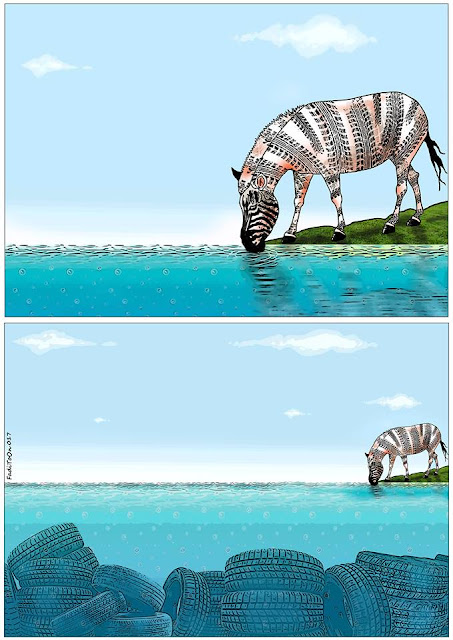"I am making you a drawing"
Plantu rarely
seems happier than when he gets the chance to verbally share what he is putting
on paper as part of his act of drawing.
 |
| Screenshot from the video underneath |
This little video is from a series of eight made for the International Women's Day on March 8 this year in which he would take out an old drawing to study the how and why it came about:
And so Plantu
would not be Plantu unless he immediately reached for a pen to continue drawing
with one arm energetically on what has just been made and often still wet. His forte
is in drawing as process; he is the narrator from whom new facets of the tale
constantly sprout onto the paper until the whole surface is covered. As his
beholders we meet a drawing consisting of a central problem or question from
which has developed chains of ideas each of which has spawned a new one that in
its place has produced another. Each of them reflecting an aspect of the
original problem put onto paper, with the chains of ideas twisting and twirling
across the plane.
The
process has basic similarities to a debate, and as Plantu publishes his daily
cartoon on the front page of Le Monde, his drawing equals a written
editorial. He draws a first outline of a problem or issue just as a written
piece would have been drawn up, discussing the implications while making his
own position clear. In all meanings of the word this is proof of the drawing as
an intellectual medium. His personal inference is never a final say, instead
his pictorial signature is a mouse running everywhere wondering, examining and
exposing and thus adding to the overall discussion on the picture plane. This
is drawing taking place in time, unfolding in space.
 Screenshot from the video above |
It is of
course by Plantu and crowns the full pages of Le Monde, in which he
takes a wider view on specific topics each time bringing together the takes
from a handful of cartoonists. The cartoonists all represent the Cartooning for
Peace of the United Nations, of which Plantu and Kofi Annan were the founding fathers. Cartooning for Peace is in fact a true offspring of the UN in that it has created a platform for dialogue not least among the professional cartoonists themselves.
Until recently cartoon art was defined as a national medium, something only to be understood within its own national borders. Tacit cultural codes including humor - and all that. Now the cartoonists define themselves internationally, which is not just a consequence of the social media, but the simple fact that they have come to know each other personally.
Until recently cartoon art was defined as a national medium, something only to be understood within its own national borders. Tacit cultural codes including humor - and all that. Now the cartoonists define themselves internationally, which is not just a consequence of the social media, but the simple fact that they have come to know each other personally.
The drawing
before us was made 30 years ago and is now getting new heads next to the
original to show how the attitude to women has changed all too little. The
sparing number of lines emphasize how the woman is a type, just as the man is one
in his gravity, and so they are both redrawn next to their
original aspects to show how and what they stand for.
 |
| Screenshot from the video above |
A drawing from his hand is never a given. It is a process, continuously happening.

